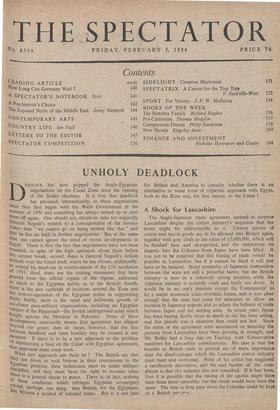A Shock for Lancashire
The Anglo-Japanese trade agreement seemed to surprise Lancashire despite the cotton industry's suspicion that the terms might be unfavourable to it. Certain quotas of cotton and rayon goods are to be allowed into Britain again, together with grey cloth to the value of £3,000,000, which will be finished here and re-exported, and the restrictions on imports into the Colonies from Japan have been lifted. It was not to be expected that this freeing of trade would bo popular in Lancashire, but if it cannot be liked it will just have to be lumped. Bitter memories of Japanese competition between the wars are still a powerful factor, but the British industry is now in a relatively strong position, while the Japanese industry is certainly weak and badly run down. It would be in no one's .interests except the Communists' to let a major economic crisis overtake Japan, and it was clear enough that the time had come for measures to allow an increase in Japanese exports and to adjust the balance of trade between Japan and the sterling area. In recent years Japan has been buying nearly twice as much as she has been selling, and this plainly was a situation that could not last. Since the terms of the agreement were announced on Saturday the protests from Lancashire have been growing in strength, and Mr. Butler had a busy day on TueSday with Conservative members for Lancashire constituencies. His case is that the benefits to British trade in general are of more importance than the disadvantages which the Lancashire cotton industry must meet and overcome. None of his critics has suggested a satisfactory alternative, and the real burden of the com- plaints is that the industry was not consulted. If it had been, then it is possible that the raising of the quotas might have been done more smoothly:-but-the result would have been the same. The time is long past when the Colonies could be kept as a British pre •erve.


































 Previous page
Previous page